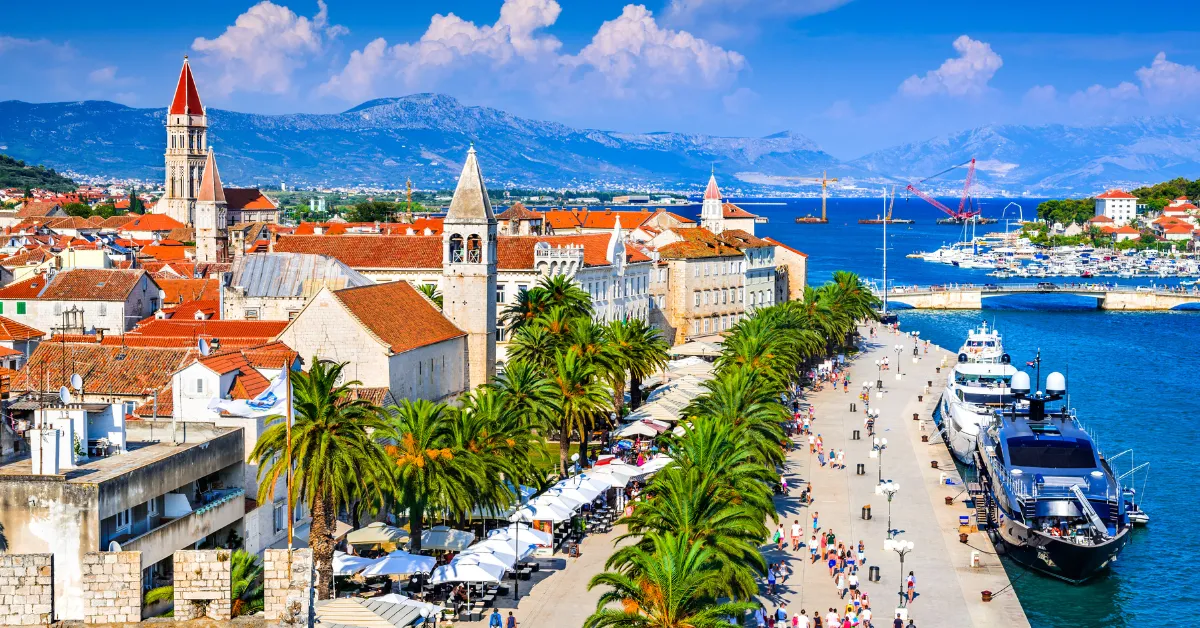Searching for the best European country to lay roots in? Check out these pros and cons of living in Croatia.
In the past few years, Croatia has cemented itself on the list of top destinations in Europe, with its turquoise seas, laid-back lifestyle, and picturesque islands. While many people will find the country to be the ideal place to settle, others will cross it off the list quickly.
This list of advantages and disadvantages of living in Croatia aims to provide an unbiased look into daily life in the European nation to decide whether it’s the right place for you.
After all, living in a country for several years (or even forever) is vastly different from taking a short vacation there.
Pros Of Living In Croatia
Croatia seems like an idyllic destination, and it is! Check out these advantages of living in this corner of Europe.
Relaxed Lifestyle
The first pro of living in Croatia is its slow-paced lifestyle. While this may take some adjusting for those who have left high-stress countries where productivity is king, the majority of people adore the more relaxed approach to life in Croatia. Croatian residents live by the attitude of “Fjaka,” which has no direct translation.
The concept is similar to Danish hygge and reminds residents of the importance of letting go of stress and unwinding. Fjaka is a state of nothingness, which is believed to be a gift from God. That moment when you’re dozing and are vaguely aware of the world but don’t really care about anything going on… that’s Fjaka. It’s an absence of worries, ambition, and productivity — all those things that are constantly churning in our minds during everyday life leave and shut the door behind them during this state of in-between.
Alongside Fjaka, Croatians put a big emphasis on spending time with friends or family. Whether that’s taking the kids on a walk along the seafront, or enjoying a cup of coffee outside a café, loved ones are the top priority for most locals.
Fantastic Weather
Another benefit of living in Croatia is its endless sunny days. In fact, the country experiences over 250 days of sunshine annually. While this doesn’t top the list for the highest number of sunshine hours in Europe, the weather in Croatia is clear and warm for the majority of the year. Temperatures reach up to 30 degrees Celsius throughout the summer.
With its diverse climate, Croatia’s winter temperatures vary depending on your location within the country. However, generally, conditions don’t drop below 5 degrees Celsius. Winters can be wet across Croatia during these months, and even snowy in some cities, such as Split, however, you won’t experience the freezing blizzards of other European nations in Croatia.
Close Proximity To Other Destinations
Croatia sits in the Balkan Peninsula in the southeast of Europe. From here, you’ll find it easy, quick, and budget-friendly to visit a multitude of destinations across Europe, as well as further afield into Asia.
You can take a flight to other European destinations, including Slovakia, Austria, and Denmark starting at around €40 with a budget airline.
Alternatively, you can travel via train to several European nations from the capital city of Zagreb, including Hungary, Switzerland, Slovenia, and Germany. Croatia is included in the Interrail Pass, making transport between countries easy and efficient.
Diverse Landscape
Croatia is one of those destinations that has it all. Known as the “land of a thousand islands,” Croatia is home to a multitude of small, wild isles off its coast, covered in vibrant greenery, pristine sands, and dazzling waters.
These islands are mostly uninhabited, though around 50 of them have small populations, with a scattering of families spread out across the small land masses. The populations are declining over time, because of transportation difficulties to the mainland causing residents to relocate.
As well as its many unspoiled islands, Croatia has plenty of national parks, including Plitvice Lakes National Park. This natural gem is famous for its collection of tumbling waterfalls that meet in an ethereal pool. The effect is stunning and experiencing it first-hand feels as though you’ve stepped out of a fairytale.
City slickers won’t be disappointed by historic Dubrovnik, Zadar, and Zagreb, which are full of culture, arts, and mouthwatering cuisine.
Safe Country
Something you might be concerned about is the safety of living in Croatia. We’re happy to report that Croatia is one of the safest nations in Europe. While it’s important to keep your guard up and bear in mind standard safety advice, Croatia has a relatively low Crime rate. Of the crimes committed, most are petty theft or other non-violent offenses. Violent crimes are almost unheard of, which will bring solo travelers to the country some peace.
Females traveling alone also often report feeling completely comfortable roaming the streets of Croatia without a companion. As with most other destinations in the world, you’ll need to be more aware of your personal safety in major cities, where pickpocketing and petty theft can be rife.
Easy Digital Nomad Visa
Croatia has a dedicated visa for digital nomads and remote workers, which enables you to live and work (remotely) in the country for up to a year. The visa was established at the start of 2021 and has seen rip-roaring success among entrepreneurs and digital nomads alike.
In order to qualify for the digital nomad visa in Croatia, you must not be a citizen of a European Union (EU) or European Economic Area (EAA) country. You must also be able to show proof that you earn over €2,300 per month, and that your income comes from outside the Croatian workforce.
You’ll be exempt from double taxation under the Croatian digital nomad visa, which is not the case in other countries.
It’s even easier for EU citizens. Free movement is in place for all European residents, meaning you can up sticks and call Croatia home immediately.
Cons Of Living In Croatia
Despite its perfect climate and stunning diversity, there are several cons to living in Croatia. You should consider these before booking a one-way ticket and putting your furniture into storage.
Difficult Language
Croatian is vastly different from Latin-based languages, such as English. This means that those who struggle with learning languages are likely to find Croatian challenging. The language has Slavic origins and has seven different case endings, making it extremely complex.
The Foreign Service Institute has declared Croatian as one of the most difficult languages to learn. One saving grace of mastering Croatian is that you’ll find it easy to pick up other Slavic tongues, such as Serbian and Bosnian.
Feeling nervous? There’s no need to be. The majority of residents have a good understanding of English. Not only can you manage a basic chat with numerous hand gestures, but you’ll be able to hold more involved conversations, which is fantastic news for those wanting to rent an apartment or open a bank account.
Bureaucracy
The Baltic nation’s bureaucracy is in a league of its own. In fact, it’s a real disadvantage of living in Croatia, and one that irritates many ex-pats. From opening a bank account to applying for a visa, all official business in Croatia is hard.
For example, if you are renewing your temporary residence visa, you’ll be required to produce your birth certificate. Sounds simple, right? Not so. Your birth certificate must be less than six months old, which means you’ll need to pay to order a new one every year, despite yours being totally legal and valid elsewhere.
This is just one example of odd, and often outdated, rules and regulations that institutions follow blindly without considering changing. If you decide to live in Croatia, you’ll need to have a good deal of patience and a sense of humor to deal with the frustrating bureaucracy.
Complicated Taxes
Croatia has some of the most complex taxes in the world, that vary based on a variety of factors and are bound to mess with your head. Generally speaking, you become liable to pay taxes after 180 days in the country, but this depends on your type of income.
Pensions are taxable as is passive income. However, those who are in possession of a digital nomad visa are exempt from paying taxes.
Unlike most nations, the tax rate differs between cities. While most residents pay around 12% in income tax, those living in Zagreb will pay 18%. If you will be subject to taxes, it’s worth considering your location and opting to reside in a region with a lower percentage of taxation.
Final Thoughts On Living In Croatia
Now you’ve read our list of the biggest pros and cons of living in Croatia, what do you think?
Those looking for a safe destination to slow down and work nomadically should seriously consider a move to the Baltic nation. However, those who become easily irritated by official tasks, such as paying taxes or applying for visas, should reconsider whether the benefits outweigh the disadvantages.
Are you still searching for your perfect destination? Check out these posts:
- Pros and cons of living in Cyprus
- Pros and cons of living in Turkey
- Pros and cons of living in the UK
Do you have your travel insurance?
- ☑ SafetyWing offers affordable travel medical insurance. Prices start at $45.08 / 4 weeks.
- ☑ Created by nomads, for nomads.
- ☑ Covers quarantine and Covid-19.
- ☑ You can pay per month, and stop at anytime.



